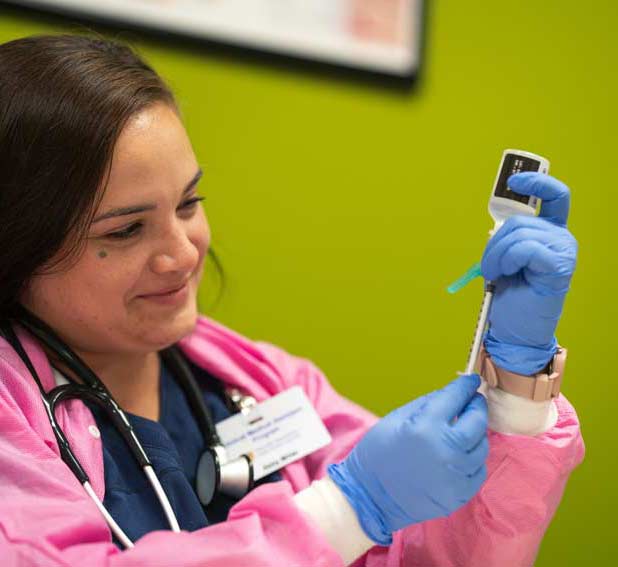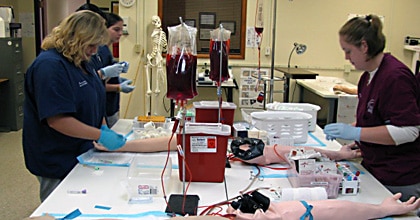Day in the Life as a Student in a Phlebotomy Training Course
Wiki Article
The Course to Certification: Understanding the Phlebotomy Training Course Journey and Its Importance
As you think about the course to certification in phlebotomy, it's important to recognize the function you'll play in health care. Your training will cover essential abilities, from blood collection strategies to patient communication.
The Function of Phlebotomists in Healthcare
Phlebotomists play an essential function in the healthcare system, serving as the vital link between individuals and vital analysis testing. You'll perform blood attracts, guaranteeing examples are collected properly and safely. Your expertise aids in diagnosing clinical conditions, checking health and wellness, and guiding treatment choices.In your daily interactions, you'll require to establish count on with people, making them feel comfortable during what could be a stressful experience. You are in charge of classifying and handling samples meticulously to avoid contamination or errors, which can influence test results.
Yet, you'll usually work together with medical professionals and nurses, connecting vital details regarding people' conditions. Your function is essential in maintaining the operations in healthcare setups, making sure prompt and exact results. By mastering your abilities, you contribute meaningfully to patient treatment, making you an essential component of the medical team. Welcoming this obligation is essential to your success as a phlebotomist.
Review of Phlebotomy Training Programs
When discovering phlebotomy training programs, you'll locate numerous types made to fit different timetables and finding out styles. Each program assists you create important skills like blood collection and person communication. Comprehending these alternatives is key to selecting the right course for your career.Kinds Of Training Programs
A number of kinds of training programs are available for those looking to end up being skillful in phlebotomy. Additionally, some health centers and clinics provide on-the-job training programs, supplying sensible experience while you learn. Whatever path you pick, each program intends to equip you with the required abilities for an effective phlebotomy career.
Trick Abilities Developed
Grasping phlebotomy needs a set of crucial abilities that are established with detailed training programs. You'll learn technical abilities like correct blood vessel selection, needle insertion, and blood collection methods. These hands-on techniques guarantee you can do treatments safely and efficiently. Furthermore, interaction abilities are fundamental; you'll need to connect with patients, describe treatments, and placed them secure. Understanding composition and physiology is vital, as well, as it assists you situate blood vessels and recognize the body's response to blood draws. You'll get knowledge of safety protocols and infection control, assuring you maintain a clean and sterile setting. Each of these abilities is essential for your success as a certified phlebotomist, making you a valuable property in any type of health care setting.Key Parts of a Phlebotomy Program
In a phlebotomy training course, you'll focus on crucial topics that lay the groundwork for your future profession. You'll participate in hands-on training that permits you to use what you've found out in real-world settings. Both the core curriculum and practical experience are essential for your success as a phlebotomist.Core Curriculum Introduction
While pursuing a phlebotomy training program, you'll run into a core curriculum designed to outfit you with essential skills and understanding. Phlebotomy school. This curriculum typically includes composition and physiology, concentrating on the blood circulation system and understanding blood components. You'll likewise find out about various kinds of blood collection approaches, including venipuncture and capillary puncture methodsFurthermore, infection control and security procedures are crucial components, ensuring you know how to maintain a sterilized atmosphere. You'll examine patient interaction, highlighting interaction and empathy, which are important for reducing patient anxiousness. Lastly, honest and legal considerations will be addressed, preparing you for real-world responsibilities. This fundamental expertise will certainly enable you to excel as a phlebotomist and provide quality treatment in professional setups.
Hands-On Training Experience
Getting hands-on experience is a vital part of your phlebotomy training program. This practical training permits you to use what you have actually found out in a real-world setup, improving your skills and confidence. You'll practice Phlebotomy Training Course venipuncture strategies, discover how to handle various sorts of samplings, and get familiar with the equipment utilized in the area. Under the support of knowledgeable trainers, you'll refine your abilities, guaranteeing you're planned for any kind of scenario you could deal with.In addition, you'll get the opportunity to interact with people, which is crucial for establishing your communication skills. This mix of technical effectiveness and interpersonal abilities is crucial for your success as a licensed phlebotomist. Ultimately, hands-on training is where concept meets method, strengthening your knowledge and readiness for certification.
Accreditation and Licensing Needs
Before you can start your job in phlebotomy, it is vital to understand the accreditation and licensing needs that vary by state. The majority of states require phlebotomists to hold an accreditation from an identified organization, such as the National Phlebotomy Organization or the American Culture for Clinical Pathology. These accreditations normally entail passing a test that tests your understanding and skills in the area.In addition to accreditation, some states have details licensing requirements. You may require to finish a particular number of hours in scientific technique, submit evidence of training, or go through a history check. It is essential to research your state's policies to ensure you satisfy all needed requirements.
Staying notified regarding these requirements not only helps you secure a setting however likewise boosts your trustworthiness as an expert. By satisfying these demands, you'll be well on your way to an effective job in phlebotomy.
Hands-On Training and Practical Experience
Hands-on training and sensible experience are crucial elements of your phlebotomy education, as they allow you to use academic understanding in real-world situations. Throughout your training, you'll involve in supervised venipuncture, find out appropriate techniques, and come to be acquainted with different blood collection equipment. This straight involvement is critical for constructing your confidence and honing your abilities.You'll work very closely with knowledgeable professionals that can assist you through the subtleties of client interaction and example handling. Each session not just strengthens your understanding but likewise prepares you for the fast-paced setting of health care settings.
Furthermore, many programs integrate clinical turnings, permitting you to experience varied settings, from medical facilities to outpatient facilities. This direct exposure helps you adjust to various difficulties and individual requirements, guaranteeing you're well-prepared for your future role. Accept these possibilities, as they're necessary to becoming a competent and caring phlebotomist.
Obstacles Faced During Training
While obtaining hands-on experience is vital, it is essential to recognize the difficulties that can emerge during your phlebotomy training. You may run into anxiety when doing treatments on actual patients, particularly if you're brand-new to the setting. The pressure to get whatever right can be frustrating. Additionally, grasping the abilities needed for blood draws takes method; you might fight with method originally.Time monitoring can likewise be a difficulty, as balancing concept, practical sessions, and personal dedications can really feel daunting. You may deal with differing learning rates among your peers, causing feelings of self-doubt if you believe you're dropping behind. Finally, adapting to the various personalities of trainers can be difficult, as each may have a special training design.
Identifying these barriers early on can prepare you for success and help you establish durability throughout your training trip.
Occupation Opportunities After Accreditation

As you get experience, you might also think about focusing on locations like pediatric or geriatric phlebotomy, dealing with certain patient requirements. Some phlebotomists pick to advance their jobs by becoming research laboratory technicians or going after more education and learning in healthcare fields.
In addition, your certification can cause duties in training or overseeing brand-new phlebotomists, permitting you to share your knowledge. With the health care market continually growing, your skills will certainly constantly be in demand, leading the way for a secure and fulfilling profession. Welcome the opportunities waiting on you!
Regularly Asked Inquiries
What Is the Typical Duration of a Phlebotomy Training Training Course?
Phlebotomy training programs typically last around four to eight weeks. You'll participate in hands-on method, class guideline, and online discovering. Finishing this training prepares you for qualification and a rewarding profession in health care.Are Online Phlebotomy Courses Available?
Yes, on the internet phlebotomy programs are offered. They supply flexibility and convenience, allowing you to study at your own pace. Just verify the program is accredited to meet certification requirements and gain important skills for your profession.Just How Much Does Phlebotomy Training Generally Cost?
Phlebotomy training usually costs between $700 and $2,500, depending on the program and area. You need to consider variables like training course length, included products, and hands-on experience when picking the appropriate training for you.What Are Usual Requirements for Phlebotomy Training?
Common requirements for phlebotomy training commonly include a senior high school diploma or GED, booster shots, and a background check. Some programs may likewise need basic health care expertise or accreditations, guaranteeing you're gotten ready for hands-on training.Can I Function While Completing My Phlebotomy Training?
Yes, you can function while finishing your phlebotomy training. Lots of students balance work with their research studies, yet make specific to handle your time effectively to ensure you fulfill both work and training dedications effectively.Report this wiki page